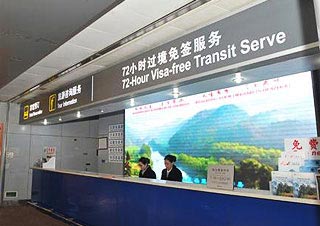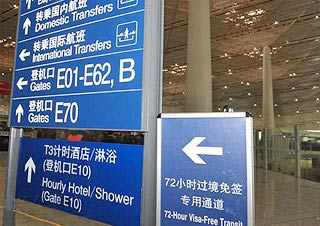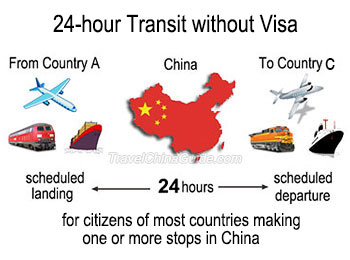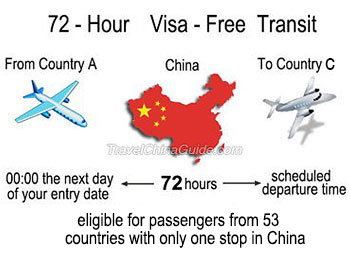72-Hour Visa-Free Transit in China
 |
| Transit Service Counter in Beijing Capital Airport |
The 72-hour visa-free transit policy in China allows air passengers from 53 countries to transit and stay for up to 72 hours (3 days) in 18 China cities without a visa. In order to facilitate international visitors' short stay in China, the policy is promising to be carried out in more and more cities in the future.
Qualified Countries
24 Schengen Agreement Countries: Austria, Belgium, Czech Republic, Denmark, Estonia, Finland, France, Germany, Greece, Hungary, Iceland, Italy, Latvia, Lithuania, Luxembourg, Malta, Netherlands, Poland, Portugal, Slovakia, Slovenia, Spain, Sweden, Switzerland
15 Other European Countries: Russia, the United Kingdom, Ireland, Cyprus, Bulgaria, Romania, Ukraine, Serbia, Croatia, Bosnia-Herzegovina, Montenegro, Macedonia (FYROM), Albania, Belarus, Monaco
6 American Countries: the United States, Canada, Brazil, Mexico, Argentina, Chile
2 Oceania Countries: Australia, New Zealand
6 Asian Countries: Korea, Japan, Singapore, Brunei, United Arab Emirates, Qatar
Cities Enjoying the Policy
Harbin, Guilin, Changsha
Beijing, Tianjin, Shanghai, Xi'an, Chongqing, Shenyang, Dalian, Nanjing, Hangzhou, Shijiazhuang, Qinhuangdao, Chengdu, Wuhan, Xiamen, Qingdao, Kunming, the whole Guangdong Province - Extended to 144-hour Visa-free Transit
Areas Allowed to Stay
![]() Cities only with the 72-hour free entry policy:
Cities only with the 72-hour free entry policy:
Passengers transiting in Changsha are allowed to travel in the whole province.
Passengers transiting in Harbin and Guilin cannot leave the transit city.
![]() Cities where the 72 hours scheme has been extended to 144-hour transit without visa (TWOV):
Cities where the 72 hours scheme has been extended to 144-hour transit without visa (TWOV):
Passengers transiting in Shanghai, Zhejiang, or Jiangsu can move around the three places. With the implementation of the 144-Hour Visa-Free Transit Policy, they can actually stay for as long as 144 hours.
Passengers transiting in Xi'an Xianyang Airport are permitted to travel in Xi'an and Xianyang.
Passengers transiting in Guangdong can travel around the whole province.
Passengers transiting in Beijing, Tianjin and Hebei can also move around the three places freely for 144 hours.
Passengers stopping over in Dalian or Shenyang can travel in the whole of Liaoning Province.
Passengers transiting in Chengdu, Kunming, Wuhan, Chongqing or Xiamen cannot leave the transit city.
Passengers transiting in Qingdao are allowed to move freely within the whole Shandong Province for 144 hours.
Recommended Tours for Transit Passengers in Different Cities
Conditions for Application
1. The confirmed seat onward ticket and valid visa to a third country or region (if required) are needed for entry. Based on the latest information, the 72 hours starts from 00:00 the day following the entry date in almost all the airports, except Beijing Airport. For example, if an air passenger arrives in Guangzhou at 08:00 on June 2nd, then the latest time for him to leave is 23:59 on June 5. In this case, the actual stopover time is more than 72 hours. However, in Beijing, the 72 hours count from the scheduled arrival time of the flight. To play on the safe side, passengers are recommended to be more conservative and not to exceed the "strict 72 hours" which counts from the flights' scheduled arrival time to the departure time.
2. The flights can only stop in one Chinese city, meaning passengers have to enter and exit from the same city, except in cities where the 144-hour visa-free transit has been implemented. For instance, if a flight lands in Xi'an via Beijing, passengers are not able to enjoy the policy. In addition, Hong Kong, Macau and Taiwan are regarded as a third region in terms of transit issues. If a flight passes USA – Beijing – Hong Kong/Macau/Taiwan, passengers are able to enjoy.
3. Only use flights to transfer in China. Passengers using other vehicles (including using flight for single trip) are not eligible to enjoy the policy.
4. Passengers are required to leave from the same airport that they arrive, except in some of the cities with 144-hour visa-free transit scheme where they may enter or leave from land or sea ports.
Documents for Application
![]() Passport valid for at least 3 months from the date of entry. Actually there are cases that some passengers are denied at the immigration counter because the remaining validity of their passport is not more than 6 months, so it's better to keep your passport valid for at least 6 months to play safe.
Passport valid for at least 3 months from the date of entry. Actually there are cases that some passengers are denied at the immigration counter because the remaining validity of their passport is not more than 6 months, so it's better to keep your passport valid for at least 6 months to play safe.![]() Visa for a third country or region (if applicable)
Visa for a third country or region (if applicable)![]() A full completed Arrival/Departure Card (including name, nationality, passport no., visa no. & issuance place, flight no., purpose of visit, date of birth, gender)
A full completed Arrival/Departure Card (including name, nationality, passport no., visa no. & issuance place, flight no., purpose of visit, date of birth, gender)![]() An onward ticket with confirmed seat are needed
An onward ticket with confirmed seat are needed
Procedure
 |
| Direction Boards for 72-hour Special Counter |
1. It is necessary to inform the airline at check-in, so that they can declare your request to the airport custom before landing. Passengers transiting via Beijing Capital International Airport can apply for this free transit permit after arrival.
2. There is a special counter/lane for the 72-hour free transit at the immigration, so passengers can go there directly by following the signs. For example, the immigration channels 2 to 4 are for 72-hour TWOV passengers in Guangzhou Baiyun International Airport.
3. After the request to enjoy the 72-hour China TWOV is approved, the officer will stamp a stay permit on your passport. The duration of stay is written on the passport. Remember to tell the officer that one wants to use the 72-hour free transit if he/she already has a valid visa for China.
4. After leaving the airport, remember to register at local police station within 24 hours of arrival if one wants to stay over 24 hours. Those who live with family or friends need to go to register in person at the police station with relatives or friends. Those who live in hotels do not need to go, because the hotels will do it for the guests.
5. If visitors are unable to depart on time due to unavoidable reasons, such as flight cancellation or treatment of sudden disease, they need to apply for a visa from Municipal Public Security Bureau (PSB). Otherwise, tourists cannot apply for an extension of stay.
Difference between 72-Hour Visa-Free Transit and 24-Hour Visa-Free Transit
Direct Transit within 24 hours is available for any nationality passenger and it is applicable to any vehicle, while the 72-hour Free Transit is only possible for passengers from designated countries and requires to transit in the airport.
Two pictures are helpful to make you clear.
 |  |
Other Services for Free Transit
There are service centers for transit passengers in the terminals, offering rest places with drinking water and reading materials if they do not want to leave the airport. For visa-free transit passengers, the airports also provide services for currency exchange, mobile phone rental, car rental, left luggage, as well as local souvenir shops. Tour buses are available from the terminals for the convenience of tourists.![]() Read FAQ about 72-hour Visa-free Transit
Read FAQ about 72-hour Visa-free Transit![]() Note:
Note:
In case that 1) you can't provide any of the required documents listed above, 2) or your flight route does not qualify, 3) or you have the record of overstaying in a country or getting visa refusal before, your application for the 72-hour visa-free transit permit may be refused. For fear of troubles caused by such cases, please make sure that you are eligible or apply for a regular transit visa in advance.
 Reply
ReplyThank you
 0
0 0
0 Reply
Reply Reply
ReplyWe have an absolute certainty that the permission will be obtained?
I don't want problems...
Thanks
 0
0 0
0 Reply
Reply Reply
ReplyWe're stopping in shanghai for 48hours, heading home from London, via shanghai, to auckland NZ where we live.
It looks as though we can stay up to 72 hours but do we need to apply for a short stay visa at the airport?
 0
0 0
0 Reply
Reply Reply
ReplyWe are traveling from Sydney to London and stoping at Guangzhou airport, we would like to stay at a nearby hotel as we are laying over for 19 hours, do I need a visa for such a short stay?
Thank you.
 0
0 0
0 Reply
Reply Reply
Reply 0
0 0
0 Reply
Reply

